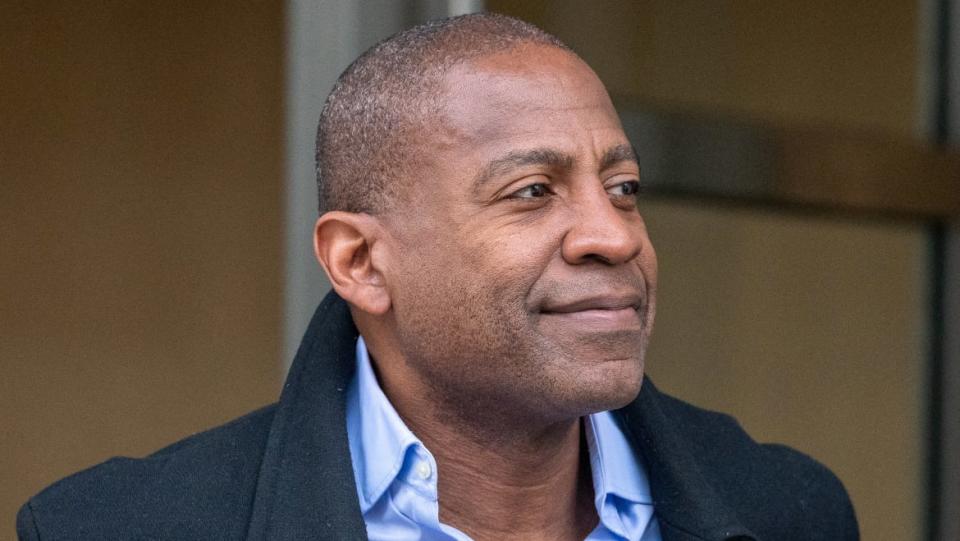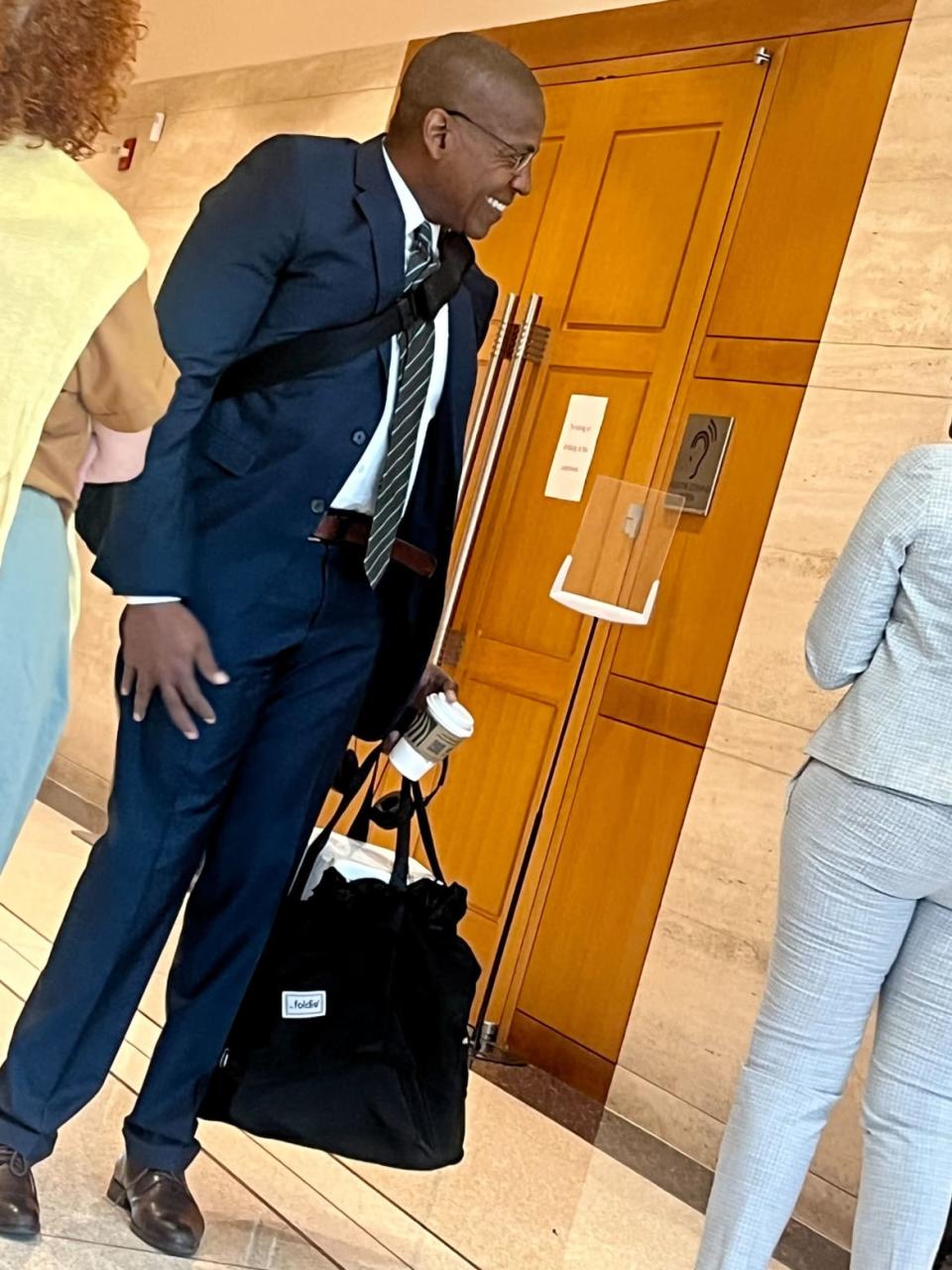Ozy Media Founder Unveils His Defense: Blame the COO

When embattled Ozy Media co-founder Carlos Watson showed up at Brooklyn federal court on Wednesday to face fraud charges, he wore a tailored navy suit, a dark-green tie, and his trademark million-watt smile.
A clutch of 25 or so supporters were on hand to observe the proceedings, among them various members of Watson’s family. On the other side of the courtroom, several FBI agents involved in the case sat in the gallery, watching quietly.
Watson, a Harvard graduate with a J.D. from Stanford Law, has been called someone with “an insatiable appetite for learning,” and a “television host with the ability to persuade high-profile guests to open up.” However, in presenting their opening arguments to the jury, prosecutors called Watson something else entirely: a liar.
“This is a case about lies,” Assistant U.S. Attorney Dylan Stern began. “Lies to get rich. Lies to get famous. Lies by the defendant, Carlos Watson.”
Watson is facing charges of securities fraud, wire fraud, and aggravated identity theft over what prosecutors say was a years-long scheme to dupe investors and banks into believing Ozy was profitable and thriving, rather than in the financial death spiral it was actually enduring. He was arrested in February 2023.

Watson in court on Wednesday.
Watson, who sat at the defense table sipping a bottle of blue Gatorade, was on a mission “to make Ozy the next big thing,” Stern said on Wednesday. But to do that, Ozy needed money. As the company’s former VP of finance would testify later in the day, Ozy was hemorrhaging cash, stiffing vendors, not paying its rent, and struggling to make payroll—sometimes missing it altogether. So, to raise funds, Stern continued, Watson and his alleged accomplices “defrauded his victims out of tens of millions of dollars.”
“I felt like I was in a pressure cooker, trying to solve something that wasn’t there,” CPA Janeen Boutre said when she took the stand around noon. “The financial strength wasn’t there. So, every day you go into work, you just have more questions than answers.”
Ozy was “always light on cash,” Boutre testified. “We would anxiously await funding… Sometimes it didn’t come.” Other startups she had worked for may have had cash flow problems, but “not like this,” Boutre said.
When Watson, 53, started Ozy in 2012, it was hailed as an up-and-comer for the Millennial crowd, and counted JPMorgan Chase and Paramount among its backers. Yet, by 2018, Ozy was not earning enough money to survive, according to Stern. That’s when, Stern said, Watson, Ozy COO Samir Rao, and Ozy Chief of Staff Suzee Han formed a “secret inner circle” at the company, which by then employed roughly 1,000 people.
Painted into a corner, Watson, along with Rao and Han—who pleaded guilty last year—went about “lying” to lenders and investors about Ozy’s precarious financial state, claiming it was profitable when it was in fact “actively losing millions of dollars each year,” Stern told the jury. Watson himself was a “micromanager,” Stern said, noting that he demanded a financial report every day, and was well aware of his company’s cash flow troubles.
Meanwhile, Ozy’s books showed revenues doubling one year, and tripling the next, which was the exact opposite of reality, according to Stern. Among other things, Watson told potential financiers that Oprah Winfrey herself had invested in Ozy.
“This was a lie,” Stern said.
Feds Accuse Ozy Founder of Sneaky Last-Minute Move Before Trial
The lies “snowballed” from there, according to Stern, who said Watson was by now creating fake contracts and forging signatures in a desperate effort to keep straight an increasing number of bogus stories he was telling.
In 2021, Watson claimed the CEO of Google was personally interested in purchasing Ozy, Stern told the jury. This was not so, Stern said. He also told bankers at Goldman Sachs that YouTube had paid “millions” for the rights to the Carlos Watson Show, a TV chat program starring none other than Watson. This, too, was made up out of whole cloth, Stern said. The scheme went south when Watson had Rao pose as a YouTube executive on a conference call with Goldman, which eventually figured out they’d been duped.
After getting caught, Rao, a Harvard grad who took the stand later in the afternoon, said he and Watson “decided” to continue deceiving investors.
“Carlos and I believed deeply in the company we were building,” Rao testified. “In order for it to survive, much less be successful, we needed to have enough cash in order to grow it, to earn more revenue, to make it profitable. Our hope was that if Ozy was successful… that would lead to success for us.”
“Did you commit those crimes by yourself?,” prosecutors asked.
“No, I did not,” Rao answered.
“Who did you commit those crimes with?”
“I committed those crimes with two people: Suzee Han and Carlos Watson,” Rao said.
If they didn’t give investors a “false and enhanced” picture of Ozy’s performance, “then they would not invest,” Rao went on. In exchange for his testimony, Rao hopes he will get a lighter sentence than the nearly two decades he faces behind bars.
“The lies that I told, the people that I hurt, the mistakes I made, over the last several years of my time at Ozy, represented the most difficult and darkest chapter of my life so far,” Rao testified. “And my hope is that being here, telling the truth, taking responsibility for those mistakes, apologizing, will allow me to start the process of moving past this and into a new chapter of my life in which I can be more productive and more proud of who I am and what I’m doing.”
Watson, for his part, eventually tried to pin the blame entirely on Rao and a “made-up mental health crisis” he had been enduring. This particular lie, Stern said, was particularly “brazen.”
“And that brings us to today,” Stern said, as a stone-faced Watson looked on.
Attorney Shannon Frison, who is representing Ozy Media itself, began her opening arguments by calling the company “revolutionary.” Ozy was “not just a startup, not just a media company,” she said. Rather, Ozy was “also about family.” Watson, his sisters, and his mother, “poured their hearts” into Ozy, along with $20 million of their own money, according to Frison.
“That’s what families do,” Frison said.
Ozy, the defense went on, “had real offices,” and “real employees,” of which 90 percent were women and people of color. It was in no way “a fly-by-night operation,” Frison insisted. In fact, Frison claimed, “Ozy Media was actually outperforming its counterparts.”
“As the saying goes, tall trees catch more wind,” Frison told the jury. “And Ozy was a tall tree.”
Yes, the case is “about lies,” she said. “Lies by Samir Rao.”
Rao suffered from depression and bipolar disorder, according to Frison, who slammed him as “incompetent for his role” at Ozy.
Ronald Sullivan Jr., who is representing Watson personally, took the baton from Frison and went after Rao, calling the ex-COO “a crooked co-founder.” Rao, according to Sullivan, “lied, he undermined, and he betrayed,” after which he got a “sweetheart deal” to cooperate with prosecutors in exchange for a guilty plea. Now, as the government’s star witness, Rao “will say whatever it takes” to get himself off the hook, Sullivan told jurors.
“Samir Rao lied, and kept lying on Carlos Watson to save himself,” Sullivan argued. “Carlos Watson is innocent.”
Sullivan attempted to paint a sympathetic portrait of Watson to the jury, calling him the son of Jamaican immigrants who got kicked out of kindergarten but then worked his way to the top of the business world as an adult.
Rao, according to Sullivan, was a rogue operator who acted alone. Watson, Sullivan insisted, in fact tried to stop Rao from breaking the law. And when he got caught, Sullivan said Rao’s story “evolved… getting juicier and juicier as he realized he was in trouble and needed to give the government some fresh meat.”
“The government says ‘they’ [did it],” Sullivan said. “There was no ‘they.’ It was all him.”
If Watson’s goal really was wealth, he had plenty of other opportunities to get it, Sullivan went on. He had lucrative job offers from Google and Goldman Sachs, which would have paid him millions, according to Sullivan. He said Watson turned down two separate secondary stock sales that would have made him a total of $10 million.
“If it wasn’t for Samir Rao, we wouldn’t be here today,” he said.
The defense, meanwhile, got off to a shambolic start, getting excoriated by U.S. District Judge Eric R. Komitee for what he said were sloppy and irrelevant document submissions., He and became irritated when a member of the defense team could not recall an exhibit number he had asked for and kept the jury “cooling their heels” outside the courtroom.
“You don’t know your own exhibit number?” a seemingly astonished Komitee asked.
“There are a lot of them, your honor,” the defense responded.
On Monday, prosecutors slammed Watson’s counsel in a letter to the judge, saying they had “significant authenticity concerns” about dozens of exhibits submitted by the defense.
“The authenticity concerns are especially acute here because the government anticipates that it will prove at trial, among other things, that the defendants conspired to falsify and forge business agreements on numerous occasions, including by changing dollar figures and modifying other key terms to make them appear more favorable to the company,” states a May 27 letter from the U.S. Attorney’s Office to Komitee. “At this late stage of the case, the government has no realistic means of confirming that the agreements the defendants have identified in its latest disclosure are accurate and authentic.”
Watson has pleaded not guilty. If convicted, he faces up to 37 years in prison.
Get the Daily Beast's biggest scoops and scandals delivered right to your inbox. Sign up now.
Stay informed and gain unlimited access to the Daily Beast's unmatched reporting. Subscribe now.

 Yahoo Finance
Yahoo Finance 